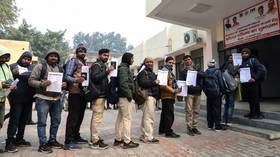
The number of people willing to serve in the IDF is decreasing every year, but will this change the militaristic nature of the country?

FILE PHOTO: Israeli soldiers patrol near the Gaza border. © Mostafa Alkharouf / Anadolu via Getty Images
Over the years, the number of people who have exempted themselves from service in the Israeli military, or Israel Defense Forces (IDF), has gone up. In 2021 it reached more than 31%. Reports suggest that by 2050 more than 50% of Israeli youth will evade conscription. Roughly 10% of those will do so due to ideology and their reluctance to support Israeli policy and actions.
Israel’s war on Hamas, which was declared shortly after the group’s deadly attacks on communities in the southern part of the country in October last year, has seen a surge in the number of volunteers for the military.
Thousands of ultra-Orthodox Jews, who are typically exempt from serving, have enrolled in the army. Hundreds of Jewish young people from around the world have come to Israel to join the IDF, and the country has registered a total of 300,000 reservists determined to protect their nation.
But Tomer Avrahami, a 25-year old anti-Zionist activist from Haifa, northern Israel – which he considers to be Palestine – was not caught up in the frenzy to join the military. As someone who wasn’t drafted for compulsory service due to his anti-IDF stance, he couldn’t bear the thought of taking part in what has become the deadliest assault on Gaza to date.

Read more
Tomer says the events of October 7 only strengthened his beliefs and provided him yet another painful reminder that Israel and Palestine will not see peace until the area, in his view, is de-colonized.
“When a person is born in a miserable refugee camp, his grandfather is a refuge on whose lands a settlement is erected, his parents earn peanuts, and he himself faces wars, experiences a blockade and has no development options, it is only logical and plausible that he will be pushed to a violent resistance against the colonizer,” he reasoned.
“The people of Gaza are massacred under full support of the western governments, with the United States at their helm, and this is a reminder for me that I don’t want to be a chess pawn in this sick game,” he added.
Tomer’s journey as a ‘seruvnik’, a rather derogatory term for Israelis who refuse to enroll in the military, started in 2016. Back then, Tomer was in a high-school, but has already realized that he could not be a part of Israel’s military machine.
“The decision not to enroll into the army sparked inside me when I was in the 11th and 12th grades, even though our school was visited several times by soldiers, who encouraged students to enroll into the service, including into combat units,” he recalled.
“Despite the fact that I grew up in a rather right-wing environment, gradually, and thanks to media, research and tours in historic Palestine, I came to the conclusion that I had no willingness to take part in the ongoing nakba [Arabic for catastrophe – ed.] of the Palestinian people. Neither did I want to serve the current Apartheid system.”
During the 1948 War, Israel carried out an ethnic cleansing campaign that resulted in the expulsion of 85% of the Palestinians that resided in the area that became Israel, and the prevention of their return. Palestinians that did manage to stay within the borders of the newly born state were kept under strict martial law until 1966. While Israel claims it treats its Palestinian citizens equally, it retains a set of discriminatory policies and laws, and many say they do not receive the same economic and social opportunities as Jews.

Read more
In 1967, when Israel seized control of the West Bank and Gaza, Palestinians of those areas were put under martial law, a move that had a negative impact on their basic rights and sparked accusations of Apartheid.
Tomer is far from being alone in his reluctance to serve. In 2016, the year he was supposed to become a conscript, the IDF registered a figure of 28% ‘refuseniks’. The vast majority of those based their decision on religion and its incompatibility with the service. Others asked for exemption citing health concerns. 6.3% were exempted for medical or ideological reasons, like Tomer himself, and recent statistics show that those numbers are only growing.
In 2021, Israel registered 31.4% exemptions for various reasons and it is predicted that by 2050 more than half of Israeli youngsters will not serve in the IDF.
The vast majority will not enroll because of religious reasons, while some 10% will refuse because of health or conscientious objection.
That refusal, however, can cost them dearly. Just recently, a military court sentenced Tal Mitnick to 45 days in prison for his rejection of the war in Gaza and the ongoing occupation. This came after he had already served two 30-day sentences, and the likelihood that he will be sentenced again after his release in April is high.
However, time behind bars is not the only possible consequence. Another is potentially being shut out of high ranking jobs in several lucrative sectors, as well as the general public’s condemnation of the ‘refuseniks’.
Tomer confesses that before he made up his mind, people around him were also concerned with the repercussions of his decision not to serve.
“Initially, my parents were trying to talk me out or my refusal, primarily for utilitarian reasons. But thankfully in the end my mom supported me and even came with me to the military psychologist,” he said.

Read more
“As for the opinion of the general public: despite my concerns, with time I discovered that many just don’t care… from my experience in academia, so far I haven’t encountered any obstacles. Although there are stipends that prioritize released soldiers… and there are work places that wouldn’t recruit those who didn’t serve, generally speaking it doesn’t seem to be an issue. At least not until you tie your refusal with political motives,” he explained.
Yet, this rather accepting attitude might soon change. Over the years, Israeli society, which has always been rather conservative and cherished the IDF, has moved even further to the right. In 2013, for example, that number stood at 43%. By 2015, it had increased to 45%. And three years ago, 51% said they would vote for the right.
A similar trend has also been registered among Israel’s youth. In 2022, a survey revealed that some 45% of people between the ages of 18 and 24 would vote for the right-wing bloc headed by Prime Minister Benjamin Netanyahu. And Tomer believes the events of October 7, 2023 will only make this tendency stronger.
“The war has further radicalized the Israeli society that has been radical from the first place. Of course I don’t possess concrete numbers but I can assume that the war will lead to more attempts of the state to recruit people, especially to combat units.”
By Elizabeth Blade, RT Middle East correspondent




